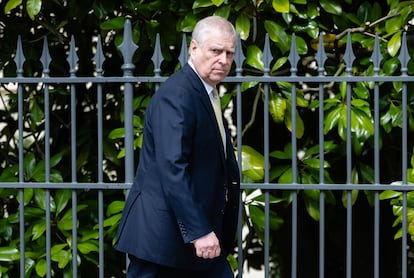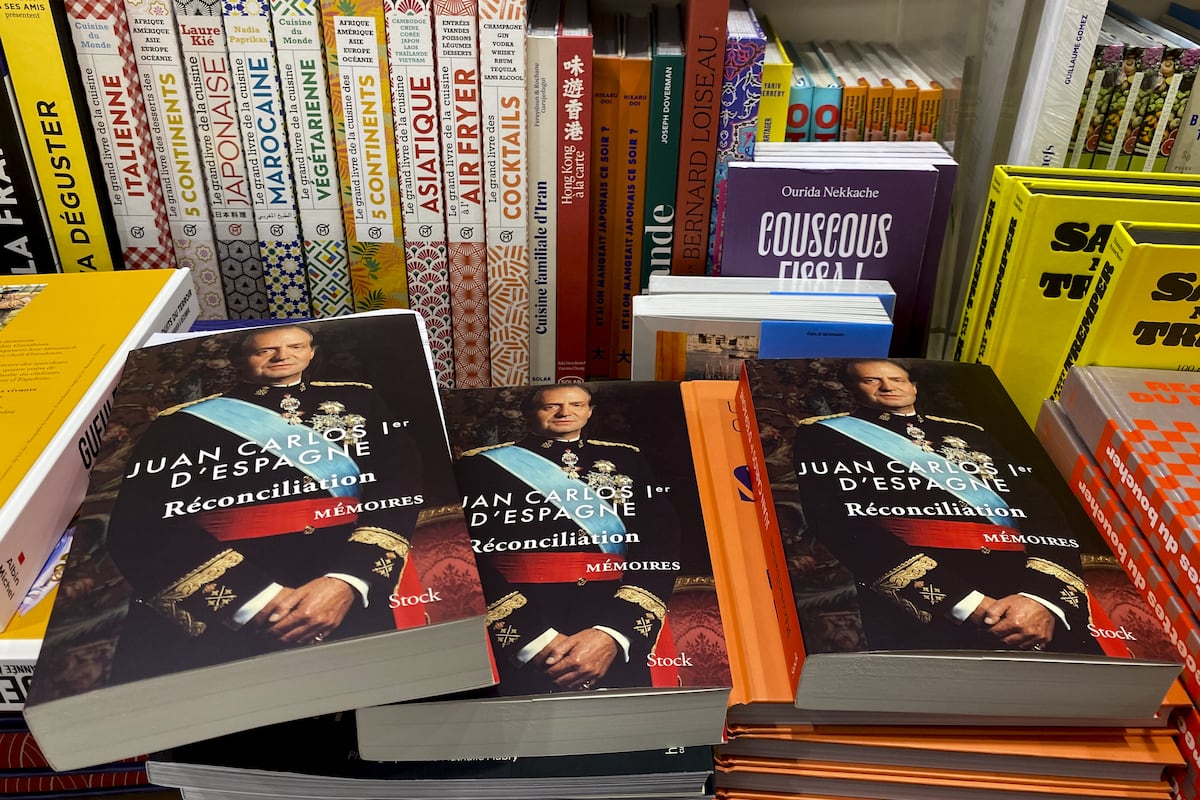When French authorities accused Prince Luis Fernando de Orleans y Borbón of drug trafficking, Spain’s Alfonso XIII quickly pulled strings to ensure the scandal involving his cousin went as unnoticed as possible. The year was 1924, Miguel Primo de Rivera’s dictatorship was just beginning, and the Spanish king managed to silence the matter by pressuring the media and making his troublesome relative disappear. Stripped of his titles and condemned to exile, Luis Fernando died in Paris in 1945, impoverished and forgotten by the Spanish people. Eighty years after the prince’s death, the Crown no longer finds it so easy to sweep its controversies under the rug.
Juan Carlos I, grandson of Alfonso XIII, has just published his memoirs in France with the intention, in his own words, of reconciling with his past, his family, and Spain. But Reconciliation, which will arrive in Spanish bookstores in December, has only reopened old wounds. Television, newspapers, online publications, magazines, and social media streamers specializing in the monarchy have spent days dissecting the book’s most sensitive issues without restraint: the almost father-son bond the monarch had with Francisco Franco and his complicity with the dictatorship; his role in the February 23, 1981 coup attempt; his fortune and opaque finances; his extramarital affairs; and even his personal differences with Felipe VI and Queen Letizia.
The omertà enjoyed by Juan Carlos is a thing of the past. That pact of silence began to crack in the summer of 1992, when Spain’s then-prime minister Felipe González was forced to reveal that he could not appoint a minister because the king was not in Spain. A simple phrase — “the King is not here”— caused the first fissure in the great taboo of the Spanish transition to democracy: the end of silence about the private life of the head of state.
Amid that commotion, EL PAÍS reported that the king was in Switzerland undergoing “a routine check-up.” Juan Carlos I had to return to Madrid to meet with González, but he failed to quell the rumors about the true nature of his absence. In an unprecedented move, the press of the time spoke frankly about his friendship with a well-known lady of Mallorcan society and pointed to this relationship as the reason for his secret trips abroad. Twenty years later, in 2012, another unannounced trip, this time to Botswana, and another affair, with Corinna Larsen, finally shattered the great taboo that had long made the monarch an untouchable figure for the Spanish press.
“In the case of Spain, there was a tacit pact of silence for many years. It was the editors of the major media outlets who told their reporters: ‘Be careful what you write about the royal family. We don’t want any problems.’ It was an institution that had just been restored, and we had to be careful with them,” acknowledges Carmen Enríquez, who was a journalist for Spain’s public broadcaster TVE for 37 years, working as a royal correspondent from 1990 to 2007.
According to Enríquez, the media and social networks have played a major role in the current wave of openness. “Before, there was much greater opacity; far fewer things came to light. The royal family was overprotected. Now, the media and all institutions are very attentive to what is said on social networks, and that influences them to go a little further when reporting. It’s as if the light has come in, sometimes against the interests and image of the royal family,” she says.
 Juan Carlos I and Fidel Castro during their meeting in Guadalajara (Mexico), in 1991.Manuel H. de León (efe)
Juan Carlos I and Fidel Castro during their meeting in Guadalajara (Mexico), in 1991.Manuel H. de León (efe)
José Antonio Zarzalejos, who was director of the monarchist newspaper ABC from 1999 to 2004 and from 2005 to 2008, agrees with Enríquez. “With new technologies, traditional media outlets have lost their exclusive role as intermediaries. It’s a paradigm shift in information, communication, and transparency in all societies. And this seriously affects monarchies, an institution that is counter-majoritarian and, by necessity, opaque,” the journalist points out. “The monarchy must always maintain a liturgical distance to preserve its mystique, and this clashes with current demands for information and transparency. This clash underscores the significant difficulty that monarchies, as non-elected institutions, have in being explained within democratic contexts.”
Accusations of abuse
The Spanish monarchy is not the only one to have been shaken by a book. The recent publication of Virginia Giuffre’s posthumous memoirs in the United Kingdom has put King Charles III in a difficult position. Giuffre’s revelations in Nobody’s Girl, in which she accuses Prince Andrew of sexual abuse and implicates him in the trafficking ring of U.S. magnate Jeffrey Epstein, have forced the British monarch to disavow his brother, stripping him of his titles and honors, removing him from the royal family, and banishing him from the Windsor estate.
“There’s a Darwinian law at play in royal houses for their survival: those who threaten the institution are removed. This was the case with the brother of Charles III. It was the case with Queen Juliana of the Netherlands when her husband, Prince Bernhard, was accused of taking bribes. It was the case with King Edward VIII. This is very old. Ferdinand VII didn’t allow his father, Charles IV, to die in Spain. Alfonso XIII didn’t allow his grandmother, Isabella II, to die in Spain,” explains Zarzalejos. “But this law, once unspoken, is now more difficult to enforce due to increased transparency. This change in standards forces a restriction on the number of members in royal families. They can no longer be very large. Felipe VI has been very astute in this regard, limiting the royal family to six members.”
King Charles’s decision attempted to contain the damage caused by his brother, but Andrew Mountbatten-Windsor’s virtual exile has only raised new questions. Why is the former prince still in the line of succession to the throne? Will he go to live at Sandringham, the British monarch’s private estate, as some media outlets suggest? Who will support him now? According to a recent article in The Guardian, the former Duke of York could receive an annual allowance intended to prevent him from ending up like his nephew, Prince Harry, airing his new life as a commoner in the press. The progressive newspaper indicates that this lifetime income will be paid from Charles III’s private funds and will be several times greater than the £20,000 ($26,356) annual pension Mountbatten receives from the Royal Navy.
In 1990, Baudouin I of Belgium abdicated for 36 hours to avoid signing his country’s abortion law. The monarch, a devout Catholic, cited conscientious objection. Today, Belgians are not so forgiving of their kings’ whims. In October 2020, the Belgian courts recognized 52-year-old Delphine Boël as the legitimate daughter of Albert II. Overnight, the current king, Philippe, son of Albert and nephew of Baudouin, had to open the palace doors to a new sister and grant her the title of princess. Despite being a full member of the Royal House, in 2023 Boël filed a complaint with the country’s prime minister for not receiving the same treatment as her siblings, as she was excluded from official royal family events.
 Andrew Mountbatten-Windsor, former Duke of York, attends Easter church service at St. George’s Chapel in Windsor, England, on April 20, 2025.Samir Hussein (Samir Hussein/WireImage)
Andrew Mountbatten-Windsor, former Duke of York, attends Easter church service at St. George’s Chapel in Windsor, England, on April 20, 2025.Samir Hussein (Samir Hussein/WireImage)
Now, King Philippe of Belgium has to welcome another new and unexpected member into the palace. His brother, Prince Laurent, 62, has just admitted to having a secret son. The Belgian press has reported that the king will grant the title of prince to his nephew, Clément Vandenkerckhove, 25. Vandenkerckhove will also be able to claim the style of Highness, but he will not be a member of the Royal House, will not be included in the line of succession to the throne, and will not receive an official allowance.
The media no longer remains silent about the excesses of their kings and princes, and public opinion is increasingly critical of them. The luxurious private vacations of Willem-Alexander and Máxima of the Netherlands and their daughters in Mozambique and Greece are a recurring topic of debate in the country. This summer, the Dutch press criticized the eight-week break the monarchs spent outside the Netherlands. Among their favorite destinations is the island of Spetses, an exclusive enclave in the Aegean Sea where they own a house and a yacht.
Secret trips by the House of Orange are often problematic. Princess Amalia, the future queen, lived secretly in Madrid during 2023, fleeing threats from the Mocro Maffia. This powerful and feared organized crime group in Europe offered a multimillion-euro reward for the heir to the throne, although details of the case only emerged once the princess was out of danger.
The seemingly idyllic Scandinavian monarchies are not immune to scandals and public scrutiny either. Crown Prince Haakon and Crown Princess Mette-Marit of Norway have been in the media spotlight for months due to the criminal behavior of Marius Borg, the son the princess had before marrying the future king. Borg, 28, faces some 30 charges for various offenses, including three alleged rape cases, abuse and assault, threats, and violation of restraining orders.
Mette-Marit’s son has never held an official role in the Norwegian royal family, but he was raised in the palace alongside Ingrid Alexandra and Sverre Magnus, the children the Crown Princess had with Haakon of Norway, with all the privileges that entailed. Torgeir Krokfjord and Oistein Monsen, journalists for Dagbladet, the country’s most widely read newspaper, have just published a book titled White Stripes, Black Sheep. In it, they claim that Mette-Marit may have attempted to obstruct the police investigation to protect her son.
The Norwegian Royal House has not commented on White Stripes, Black Sheep, but the book’s revelations and the steady trickle of information about the Marius Borg case have affected Princess Ingrid, the heir to the throne. The 21-year-old recenetly gave an interview to public broadcaster NRK in which she addressed the issue. The princess acknowledged that these are “very serious matters” and that it is proving difficult for her family and “for everyone affected by the case.” “Justice will have the final say,” concluded the granddaughter of King Harald and Queen Sonja. The trial against her brother is expected to begin in January 2026.
Denmark, the land of Hans Christian Andersen’s fairy tales, deserves its own chapter. The reign of Frederik X began in the winter of 2024 amid rumors of a marital crisis with his wife, Mary Donaldson from Australia. After photographs of the then-prince with Mexican socialite Genoveva Casanova were published in the Spanish magazine Lecturas, Queen Margrethe, the longest-reigning living monarch, abdicated in favor of her son on New Year’s Eve.
The unexpected and swift succession managed to quell the speculation, but the lawsuit Casanova has filed against the Spanish weekly has reignited the controversy. The Mexican, former Countess of Salvatierra and a regular fixture in the gossip pages, argues that the images violated her rights to honor and privacy. The tabloids are closely following the proceedings, awaiting further details on the story.
Crisis cabinets are already commonplace in royal households, but European monarchies are finding it increasingly difficult to brush their dirt under the plush carpets of the palace.
Sign up for our weekly newsletter to get more English-language news coverage from EL PAÍS USA Edition
